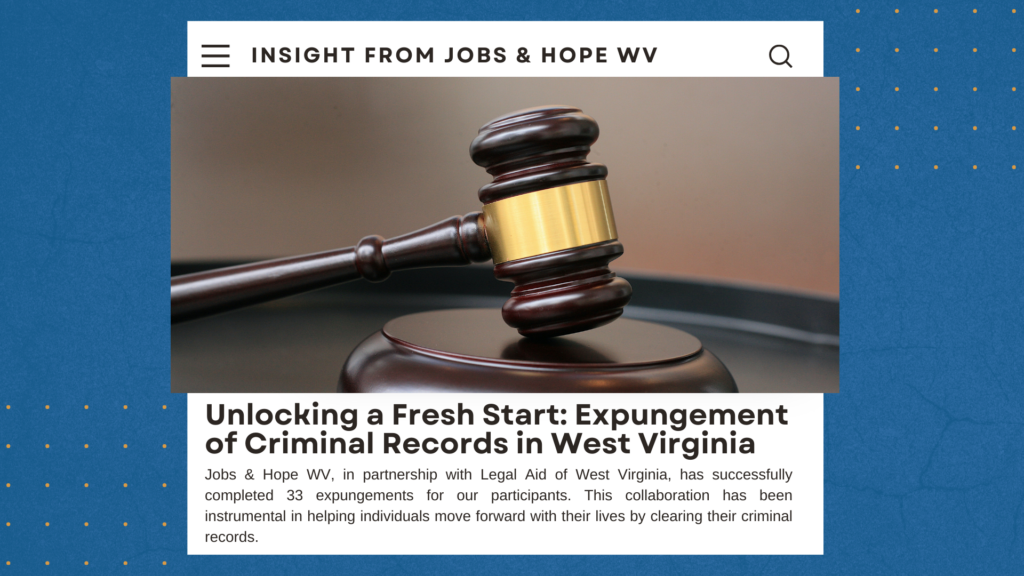Unlocking a Fresh Start: Expungement of Criminal Records in West Virginia

NOTE: This article provides general information about expungements. Due to the complexity of expungement law, it is advisable to consult with a lawyer regarding your specific case.
Jobs & Hope WV, in partnership with Legal Aid of West Virginia, has successfully completed 33 expungements for our participants. This collaboration has been instrumental in helping individuals move forward with their lives by clearing their criminal records. Expungement can provide a crucial second chance for individuals, allowing them to pursue employment, housing, and other opportunities without the burden of a criminal history.
What is Expungement?
Expungement is the legal process by which a court orders the removal or sealing of criminal records, making them inaccessible to the public. This process can be vital for individuals seeking employment, housing, or other opportunities that might be hindered by a criminal record. In West Virginia, expungement is possible for some dismissed charges and certain convictions, provided specific criteria are met and a judge approves the request.
Eligibility for Expungement
Determining eligibility for expungement in West Virginia depends on whether the record involves criminal charges or convictions. Each category has distinct rules and requirements.
Expungement of Criminal Charges
Individuals may be eligible for expungement of criminal charges if the charges were not dismissed as part of a plea agreement, they have no prior felony convictions, and there are no pending charges against them. Additionally, for those found not guilty due to mental illness or addiction, certain offenses under the West Virginia Sex Offender Registration Act cannot be expunged. There is also a mandatory 60-day waiting period from the date of dismissal or acquittal before filing for expungement.
Expungement of Criminal Convictions
For criminal convictions, eligibility includes misdemeanors, multiple misdemeanors, nonviolent felonies, or connected nonviolent felonies. However, many offenses, such as most DUIs, violent or sexual crimes, are not eligible for expungement. Furthermore, individuals must have no pending charges. It is essential to review all relevant information, and highly recommended that an individual seeking an expungement consult a lawyer, to determine eligibility accurately.
Ineligible Criminal Convictions
Not all criminal convictions can be expunged. Generally, federal convictions are not eligible, except for certain misdemeanor drug possession charges committed before the age of 21. For state convictions, only nonviolent felonies under specific conditions can be expunged. Crimes involving serious bodily harm, violence, or other severe factors are excluded from expungement. Specific ineligible offenses include, but are not limited to:
- Crimes involving deadly weapons or intentional physical injury to a minor or law enforcement officer
- Felonies against individuals, such as murder, sexual offenses, and child abuse
- Domestic violence-related offenses
- Most DUI offenses (although other convictions may be expunged if the DUI is over five years old)
- Various other misdemeanors and felonies as specified by state law
If a conviction is not eligible for expungement, the only recourse may be a full pardon from the governor. However, even a pardon does not apply to severe crimes such as first-degree murder, treason, kidnapping, or sexual offenses.
Filing for Expungement
Timing
The timing for filing an expungement request varies:
- Criminal Charges: Individuals must wait 60 days post-dismissal or post-acquittal to file.
- Criminal Convictions: The wait period depends on the individual’s overall record:
- Single misdemeanor: One year after conviction, completion of any sentence, or completion of the period of supervision, whichever is later.
- Multiple misdemeanors: Two years.
- Nonviolent felony: Five years.
- Reduced waiting periods are available for those completing approved long-term substance abuse or job readiness programs.
Steps to Determine Eligibility
- Obtain Your Criminal Record: Request records from the Circuit or Magistrate Clerk, or obtain a criminal record report from Identogo, which works with the West Virginia State Police.
- Verify Sentence Completion: Check the dates of incarceration and probation or parole completion.
- Assess the law in West Virginia regarding expungements, as it contains the excluded offenses for expungements.
With this information, individuals can determine their eligibility. Consulting a lawyer is highly recommended to ensure accuracy and compliance with legal requirements.
Filing the Paperwork
- Criminal Charges: File a “Motion for Expungement of Criminal Records Due to Acquittal or Dismissal” in the relevant county’s Circuit Clerk’s Office.
- Criminal Convictions: File a “Petition for Expungement of Criminal Records” for misdemeanors or felonies in the Circuit Clerk’s Office. The Petition must include, as attachments, proof that the Petitioner has been law-abiding and rehabilitated since the incident happened which they seek to expunge. Such attachments can include character letters in support of the Petitioner. Serve documents to relevant officials, including the State Police Superintendent and Prosecuting Attorney.
Costs Involved
- Criminal Charges: No filing fee is required.
- Criminal Convictions: There is a $200 filing fee, with potential waivers, and a $100 fee to the West Virginia State Police if the expungement is approved.
Post-Filing Process
After filing and serving all parties, the Prosecuting Attorney notifies any victims, who can file opposition. The court must decide within 60 days to grant the petition, schedule a hearing, request more information, or dismiss the case.
Multiple Convictions
Individuals can expunge multiple misdemeanors or connected felonies (meaning that they occurred in the same transaction or series of transactions), but separate filings are required in the relevant courts. This process can be complex, making legal advice crucial.
Out-of-State Convictions
Expungement laws vary by state, and this guide only applies to West Virginia. For convictions from other states, individuals must consult that state’s laws.
Life After Expungement
Once expunged, court and law enforcement records are sealed from public view, but media coverage may still exist. Generally, expunged offenses do not need to be disclosed on job or housing applications, except for specific roles like law enforcement.
The Importance of Legal Assistance
Navigating the expungement process can be challenging, particularly for criminal convictions. Consulting a lawyer can help ensure all criteria are met and the process is correctly followed.
Expungement provides a valuable opportunity for individuals to rebuild their lives without the burden of a criminal record. If you believe you might be eligible, take the first step by exploring your options—your fresh start could be just around the corner.
For more information, visit Legal Aid WV.
